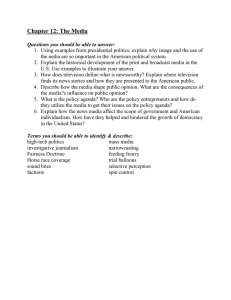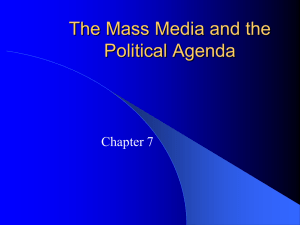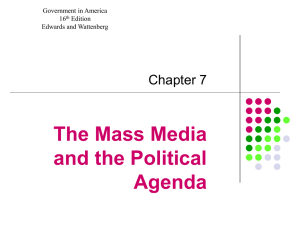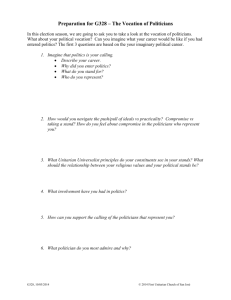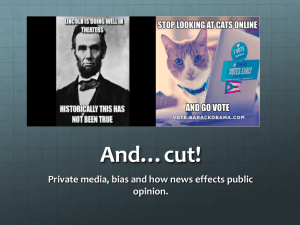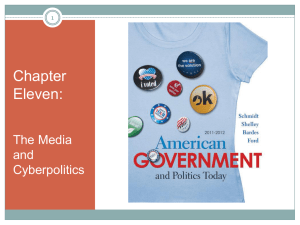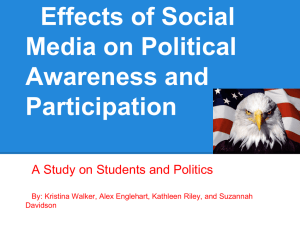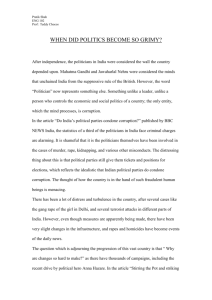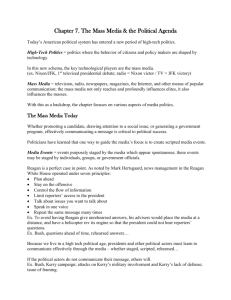Government in America, Chapter 7
advertisement
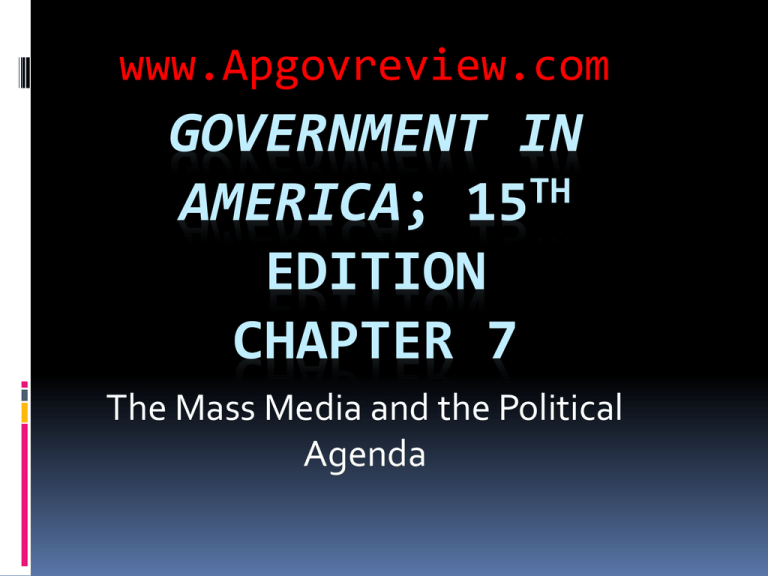
www.Apgovreview.com GOVERNMENT IN TH AMERICA; 15 EDITION CHAPTER 7 The Mass Media and the Political Agenda The Mass Media Today Media Event – set up in order to be covered Example – candidate campaigning door to door 60% of campaign spending for Presidents is spent on tv advertisements Especially in swing states Most of the ads are negative towards the opponent Image of candidates is of the utmost importance The Development of Media Politics Franklin Roosevelt changed the relationship between presidents and the media 2 press conferences a week Press did not reveal he was disabled Vietnam and Watergate changed Presidential press reporting A president’s personal life became fair game Clinton-Lewinsky scandal Investigative journalism – reporters investigating the truth of government officials Since 1960, coverage of presidents has become less favorable 2 types of media Print – newspapers and magazines (less popular) Electronic – TV and Internet (more popular) The Development of Media Politics Cont. The Print Media: 1st amendment is instrumental in the media today Citizens that read newspapers are better informed Circulation of print media has declined in recent years The Emergence of Radio and Television: Radio ownership is nearly universal Impact of TV on politics? 1960 election Coverage of Vietnam Government Regulation of Electronic Media: Federal Communications Commission (FCC) – regulates TV, radio, phones, satellites, and cable The Development of Media Politics Cont. From Broadcasting to Narrowcasting….: Broadcasting – signal is sent to a broad audience (ABC, NBC, CBS) Narrowcasting – sent to a smaller audience (MTV, ESPN, cable news) Many young adults are more engaged in narrowcasting The Impact of the Internet: Availability of information does not translate to acquisition of information Blogs have increased the influence of average citizens Private Control of the Media: Many countries have government-owned news stations (BBC) Public ownership has its benefits – news is not reliant on advertisers Reporting the News News is reported when it is different President Bush in Japan in 1992 Many networks choose to air what is entertaining Finding the News: Trial balloons – purposely leaking information to the public to test the political reaction Embedding of reporters – in order to increase access to war coverage, reporters were embedded with troops Sources wanting to expose the truth are rare, but do happen – “Deep Throat” in the Watergate Scandal Reporting the News Presenting the News: Most news coverage is superficial and lacks substance More technology has not meant more coverage, rather the opposite is true More likely to see sound bites of a speech than the speech itself 1992 – 24.6 minutes per night of the presidential campaign, 2000 – 12.6 minutes per night Bias in the News: Bias – advocating a certain perspective Mainstream media is often accused of being liberal The News and Public Opinion The media can (and does) influence how the public views politicians: Choose the stories and can increase attention to certain problems Focusing on unemployment vs. low inflation (1992) If a politician misstates something, the Media can focus heavily on that Policy Entrepreneurs and Agenda Setting Policy Agenda: Set of issues that politicians and others deem important and focus on (healthcare, Middle East, etc.) This is fluid and can (and does) often change based on circumstances Policy entrepreneurs – people that bring attention to an issue via Use press releases, conferences, and letter writing to bring attention to their cause Understanding Mass Media The Media and the Scope of Government: Americans view positively the media keeping politicians in check The media’s “watchdog philosophy” can increase the size of government by encouraging the government to solve problems Individualism and the Media: The media focuses on individuals more than groups A politician’s image is more important than ever – especially the President Democracy and the Media: Access to information does not equate to an informed society Those that access information are more likely to vote and help dictate policy Quick Recap Media Event TV’s impact on politics – 1960 election More access does not equate to more knowledge Bias Politician’s image Thanks for watching! Subscribe to my channel Help spread the word Questions? Comments? Leave in comments If only Nixon subscribed….
